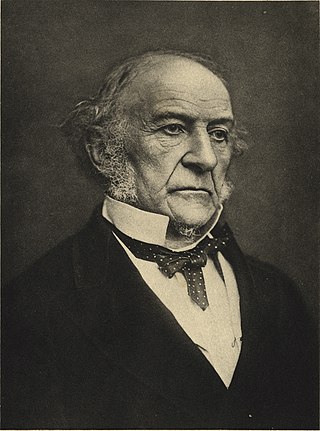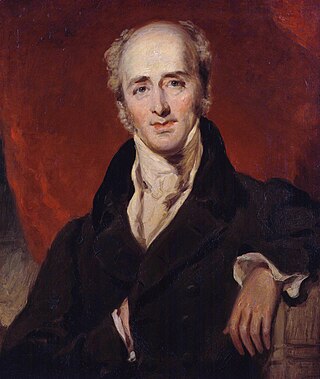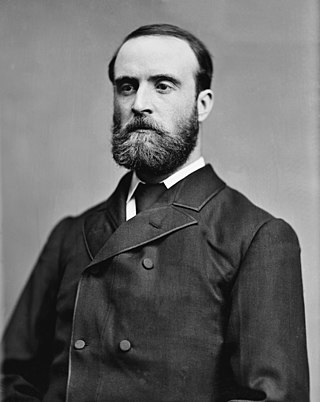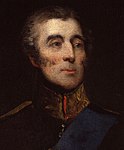
The Representation of the People Act 1832 was an Act of Parliament of the United Kingdom that introduced major changes to the electoral system of England and Wales. It reapportioned constituencies to address the unequal distribution of seats and expanded franchise by broadening and standardising the property qualifications to vote.

The 1885 United Kingdom general election was held from 24 November to 18 December 1885. This was the first general election after an extension of the franchise and redistribution of seats. For the first time a majority of adult males could vote and most constituencies by law returned a single member to Parliament, fulfilling one of the ideals of Chartism to provide direct single-member, single-electorate accountability.

The 1841 United Kingdom general election, was held between 29 June and 22 July 1841 to elect members of the House of Commons, the lower house of Parliament of the United Kingdom. In this election, there was a large swing as Sir Robert Peel's Conservatives took control of the House of Commons. Melbourne's Whigs had seen their support in the Commons erode over the previous years. Whilst Melbourne enjoyed the firm support of the young Queen Victoria, his ministry had seen increasing defeats in the Commons, culminating in the defeat of the government's budget in May 1841 by 36 votes, and by 1 vote in a 4 June 1841 vote of no confidence put forward by Peel. According to precedent, Melbourne's defeat required his resignation. However, the cabinet decided to ask for a dissolution, which was opposed by Melbourne personally, but he came to accept the wishes of the ministers. Melbourne requested the Queen dissolve Parliament, leading to an election. The Queen thus prorogued Parliament on 22 June.

The 1835 United Kingdom general election was called when Parliament was dissolved on 29 December 1834. Polling took place between 6 January and 6 February 1835, and the results saw Robert Peel's Conservatives make large gains from their low of the 1832 election, but the Whigs maintained a large majority.

The 1832 United Kingdom general election was held on 8 December 1832 to 8 January 1833, to elect members of the House of Commons, the lower house of Parliament of the United Kingdom. It was the first held in the Reformed House of Commons following the Reform Act, which introduced significant changes to the electoral system.

Representation of the People Act is a stock short title used in Antigua and Barbuda, The Bahamas, Bangladesh, Barbados, Belize, Ghana, Grenada, Guyana, India, Jamaica, Mauritius, Pakistan, Saint Vincent and the Grenadines, Trinidad and Tobago, the United Kingdom and Vanuatu for legislation dealing with the electoral system. Representation of the People Acts is a collective title for legislation relating to representation of the people, including Rating Acts and other Registration Acts. The title was first used in the United Kingdom in the 1832 Great Reform Act and was adopted in other countries of, or formerly part of, the British Empire through the spread of the Westminster parliamentary system.

The Roman Catholic Relief Act 1829, also known as the Catholic Emancipation Act 1829, removed the sacramental tests that barred Roman Catholics in the United Kingdom from Parliament and from higher offices of the judiciary and state. It was the culmination of a fifty-year process of Catholic emancipation which had offered Catholics successive measures of "relief" from the civil and political disabilities imposed by Penal Laws in both Great Britain and in Ireland in the seventeenth, and early eighteenth, centuries.

The Repeal Association was an Irish mass membership political movement set up by Daniel O'Connell in 1830 to campaign for a repeal of the Acts of Union of 1800 between Great Britain and Ireland.

The Parliamentary Boundaries (Ireland) Act 1832 was an Act of the Parliament of the United Kingdom which defined the boundaries of the 33 parliamentary boroughs which were represented in the United Kingdom House of Commons. They had originally been named in the Acts of Union 1800. Section 12 of the Representation of the People (Ireland) Act 1832, enacted on the same day, specified that the boundaries were to be defined in this separate Act.

Henry Grattan was an Irish politician, who was Member of Parliament for Dublin City on behalf of the Whigs from 1826 to 1830 in the British House of Commons. From 1831 to 1852, he represented Meath for the Repeal Association.
Cork City was a parliamentary constituency in Ireland, represented in the Parliament of the United Kingdom. From 1880 to 1922 it returned two members of parliament (MPs) to the House of Commons of the United Kingdom of Great Britain and Ireland. From 1922 it was not represented in the UK Parliament, as it was no longer in the UK.
A Liberal Repealer was a Liberal in Ireland, who supported the campaign of Daniel O'Connell for the repeal of the Act of Union 1801 and the re-creation of the Kingdom of Ireland and Parliament of Ireland which had existed before the union.
The Irish Conservative Party, often called the Irish Tories, was one of the dominant Irish political parties in Ireland in the 19th century. It was affiliated with the Conservative Party in Great Britain. Throughout much of the century it and the Irish Liberal Party were rivals for electoral dominance among Ireland's small electorate within the United Kingdom of Great Britain and Ireland, with parties such as the movements of Daniel O'Connell and later the Independent Irish Party relegated into third place. The Irish Conservatives became the principal element of the Irish Unionist Alliance following the alliance's foundation in 1891.

The Scottish Reform Act 1832 was an Act of Parliament that introduced wide-ranging changes to the election laws of Scotland. The act was passed at approximately the same time as the Reform Act 1832, which applied to England and Wales. The chief architects of the Act were Francis Jeffrey and Henry Cockburn. It was subsequently given the official short title of the Representation of the People (Scotland) Act 1832. Prior to the Act, Scotland's electorate was only 0.2% of the population compared to 4% in England. The Scottish electorate overnight soared from 5,000 to 65,000, or 13% of the adult men, and was no longer a private preserve for a few very rich families.

The Representation of the People (Ireland) Act 1832, commonly called the Irish Reform Act 1832, was an Act of Parliament that introduced wide-ranging changes to the election laws of Ireland. The act was passed at approximately the same time as the Reform Act 1832, which applied to England and Wales.
Dr Herbert Baldwin (1782–1861) was an Irish politician from Cork. He was a Member of Parliament (MP) from 1832 to 1837.
Daniel (Dan) Callaghan (1786–1849) was a prominent businessman and Irish politician who served as MP for Cork City from 1830 to 1849. As a member of the Repeal Association, Dan Callaghan sought to end the Act of Union (1800), which created the United Kingdom of Great Britain and Ireland. Callaghan, along with other Irish MP's like Daniel O' Connell, opposed the introduction of the Poor Laws (Ireland), which established the Victorian workhouses to Ireland.

The Parliamentary Elections Act 1695 was an Act of the Parliament of England regulating elections to the English House of Commons.

The 1885 general election in Ireland was the first election following the Representation of the People Act 1884 and the Redistribution of Seats Act 1885, which redrew the Irish electoral landscape.














